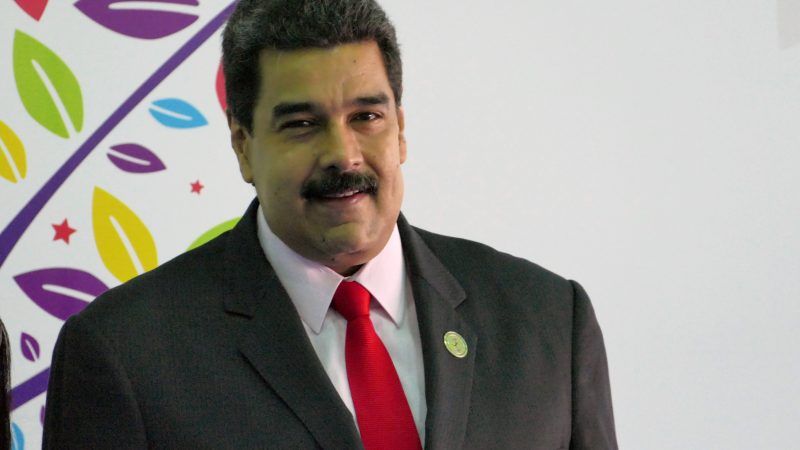Venezuelan Government Uses Arbitrary Arrests, Torture, and 'Death Squads' to Keep Order, U.N. Finds
A new report from the U.N.'s High Commissioner for Human Rights finds a "shockingly high" number of politically motivated extrajudicial killings.

A new report by the United Nations' human rights watchdog paints an unpleasant picture of repression and economic collapse in Venezuela. President Nicolas Maduro's government, it says, punishes dissidents with arbitrary arrests, torture, and even murder.
The report was written by Michelle Bachelet, the U.N.'s high commissioner for human rights. Bachelet served as Chile's left-wing president from 2014 to 2018, and she generally declined to criticize the Venezuelan regime while in office.
Venezuelan security forces killed 5,287 people in 2018 for resisting arrest during raids, according to the government's own numbers. Another 1,569 were killed from January to May of this year. Independent counts put the number of people killed by police even higher.
Hundreds of these killings were committed by the Special Action Forces (FAES). Created in 2017—in theory to target organized crime—this group was described by the U.N. investigators' informants as a "death squad" and an "extermination group."
U.N. officials spoke with 20 families of men killed by the FAES. According to the investigators, police would raid homes at night, kill the young men they encountered, and then plant guns and drugs at the scene to frame the victims. At least six people were killed by the FAES for their role in anti-government protests, U.N. investigators found.
The investigators expressed concern in their report that the FAES and other security forces were being used as "an instrument to instill fear in the population and to maintain social control."
The New York Times reports that Bachele was given remarkable access to the country. She spent three days meeting with government officials, including Maduro himself. Her investigators visited the country for two weeks in March, collecting evidence and interviewing officials, witnesses, and victims.
In addition to extrajudicial killings, the U.N. report found that some 15,000 people have been arbitrarily arrested for political reasons since 2014, including around 2,000 in 2019 alone. Many of them were subjected to torture, including "electric shocks, suffocation with plastic bags, waterboarding, beatings, sexual violence, water and food deprivation, stress positions and exposure to extreme temperatures."
The report also says that hyperinflation and food shortages have left millions of Venezuelans without access to sufficient nutrition, and that the government's food aid is often withheld from opponents of the regime.
U.S. sanctions—first applied in March 2018—are worsening the situation, according to the report. But "the economy of Venezuela, particularly its oil industry and food production systems, were already in crisis before any sectoral sanctions were imposed."
It is not news that Venezuela is a destitute country governed by an authoritarian socialist regime. But this latest report offers new details about just how much violence the Maduro government is willing to employ to stay in power.
Rent Free is a weekly newsletter from Christian Britschgi on urbanism and the fight for less regulation, more housing, more property rights, and more freedom in America's cities.


Show Comments (52)